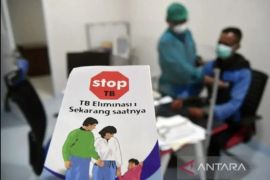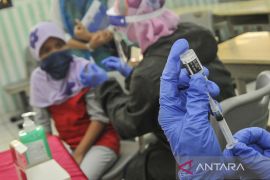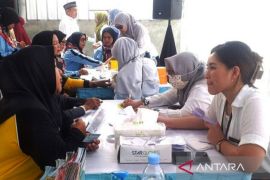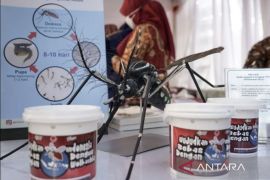Jakarta continues to promote a healthy lifestyle through the CERDIK program that encompasses routine health exams, smoking cessation, balanced diet, adequate rest, and stress management.
Moreover, the PATUH movement already targets obese people. The PATUH movement covers routine health checks; treatment of diseases through appropriate medication; a healthy diet with balanced nutrients; regular exercise; and avoiding alcohol consumption, smoking, and other carcinogens.
"Obesity is the excessive accumulation of fat due to an imbalance between energy intake and energy expenditure for a long time," Acting Head of the Jakarta Health Office Ani Ruspitawati explained.
Generally, obesity is measured on the basis of the Body Mass Index (BMI) and abdominal circumference.
Obesity is caused by two factors, with the first being genetics, while the second is diet, excess energy intake, as well as high consumption of sugar, salt, and fats, physical activity patterns, and a sedentary lifestyle.
Obesity can lead to non-communicable diseases, such as cardiovascular diseases and diabetes mellitus.
Jakarta has launched the AKU BUGAR Application wherein people can independently conduct risk screening of non-communicable diseases or be assisted by health workers.
Another effort is a Pentahelix collaboration that involves the government, professional organizations, the private party, the media, and society.
The Jakarta Provincial Government has also formed agents of change for non-communicable diseases. The agents of change are usually staff from regional working instances and educational institutions.
The provincial government also strengthens the supervision of health workers at health centers and hospitals, conducts dissemination of education to the public, and promotes healthy lifestyles through social media.
There are also fun challenges, such as encouraging the public to clock six thousand steps and 10 thousand steps and the clothing size downgrade goal.
The Jakarta Provincial Government also strives to early detect obesity and conducts nutritional interventions on children in an integrated manner.
Physician and Public Nutritionist Dr Tan Shot Yen emphasized the need for obesity to be prevented early.
Obesity can lead to several health problems, such as diabetes, hypertension, metabolic syndrome, cancer, and osteoporosis.
Four pillars of obesity prevention are leading an active lifestyle, consuming various nutritious foods, maintaining an ideal body weight, and living a hygienic and healthy life.
Obesity in teenagers and children
The Jakarta Health Office, through all local health centers (Puskesmas), regularly holds health exams on school children and teenagers in the age range of seven to 15 years.
Based on the screening result in 2022, some 59,657, or 3.64 percent, of children in that age bracket are overweight, and 14,748, or 0.90 percent, are obese.
In the 2023 first quarter screening result, 34,443, or 7.86 percent, in that targeted population are overweight, and 10,059, or 2.29 percent, are obese.
According to the Jakarta Registry and Reporting System on Productive Age Screening, or the population aged 15-59 years old in 2022, from the total 7.5 million people being checked, about 2,293,357, or 30.51 percent, are obese, with the BMI measurement.
For the central or abdominal obesity measurement, 2,605,500, or 34.66 percent, are obese.
To prevent an increase (in the number) of obese school children, there is a need to conduct follow-ups to the health screening results.
The follow-ups can be giving referrals to health centers, supervision by teachers and parents/guardians, and developing on-target programs that involve several sectors.
Health screening is conducted in public, private, and extraordinary schools, as well as Islamic boarding schools, orphanages, and juvenile prisons, to identify diseases that can hinder the learning process and children's growth.
Through those efforts, it is expected that public awareness to lead a healthy life can prevent obesity cases, especially in Jakarta.
At the national scale, the Health Ministry urges the participation and role of school health units (UKS) in tackling obesity cases in children wherein the number has increased in recent decades.
"Teachers and schools have a role in supervising children's diet and activity in schools through UKS main programs," the ministry's acting director for maternal and children's nutrition and health, Lovely Daisy, stated on on July 11.
The role of the UKS is strengthened through a joint ministerial decree on UKS development.
The UKS' main programs are health service, health education, and guardianship to realize a healthy environment.
In the health education program, UKS promotes health literacy through the My Health Report Book and initiates reproductive health education and mentors health cadres in schools.
There is also education on nutrition in the form of eating breakfast together in schools. According to the ministry, 65 percent of the children do not eat breakfast before going to school.
"We see that our children's consumption is high in salt, sugar, and fat, and meals sold in school canteens are like that too," she pointed out.
The government also promotes the Maternal and Children Health Book (KIA) that is aimed at helping health facilities to monitor children's growth, including early detection of obesity.
"It is important to monitor children's growth. If we do it regularly, we can early detect the risks of obesity. We need to weigh toddlers every month," Daisy emphasized.
Related news: Ministry to maintain obesity prevalence at 21.8 percent until 2024
Related news: Ministry encourages excise tax on GGL-dense products to tackle obesity
Editor: Rahmad Nasution
Copyright © ANTARA 2023












